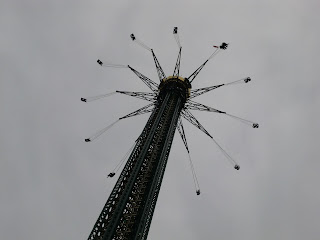Πώς
να ήταν άραγε το τραγούδι των σειρήνων;
Οι
Σειρήνες ήταν γυναικείες θεότητες, που σχετίζονταν με το νερό, τον έρωτα και το
θάνατο. Απεικονίζονταν με ανθρώπινο γυναικείο κεφάλι και σώμα αρπακτικού
πουλιού. Ανεξάρτητα όμως από την παράδοξη αυτή εμφάνισή τους, αδιαμφισβήτητα το
μαγευτικό τους τραγούδι συνέπαιρνε τον ανθρώπινο νου τόσο, όσο δεν μπορούσε να
σκεφτεί τίποτε άλλο και έτσι ο άνθρωπος έρμαιο των σειρήνων, οδηγούνταν στην
πλήρη καταστροφή του, είτε γκρεμοτσακισθείς, είτε κατασπαραχθείς από τις ίδιες
τις σειρήνες, είτε ακόμα περιπλανώμενος, άνους και άνευ νοήματος, μη
γνωρίζοντας πια ποιος είναι και που πάει.
Σύμφωνα
με την Οδύσσεια, ο ίδιος ο Οδυσσέας, ο οποίος είχε ενημερωθεί από την Κίρκη για
το τραγούδι των σειρήνων, διέταξε όλους τους άντρες του πληρώματός του, να
βάλουν κερί στα αυτιά τους, ενώ ο ίδιος ζήτησε να τον δέσουν στο κατάρτι, έτσι
ώστε να μπορέσει να ακούσει το τραγούδι τους, χωρίς όμως να παρασυρθεί από την
γοητεία τους.
Είναι
άραγε γοητευτικό ότι μας θέτει σε κίνδυνο;
Το
ύψος, η ταχύτητα, η δεισιδαιμονία, το υπερφυσικό, ότι δηλαδή μπορεί να βρει
κανείς σε ένα μεγάλο λούνα – παρκ. Το Prater είναι ένα χαρακτηριστικό παράδειγμα,
καθώς καλύπτει μια μεγάλη έκταση και περιλαμβάνει ότι μπορεί κανείς να
φανταστεί σε έξαψη, τρόμο και ακούσια ουρλιαχτά, φυσικά υπό τους δυνατούς ήχους
μιας χαρούμενης και κάπως παιδικής μουσικής.
Έτσι
και εμείς, δεμένοι σαν τον Οδυσσέα στο κατάρτι, μπορούμε να στροβιλιστούμε, να
κρεμαστούμε, να αναποδογυριστούμε, να νοιώσουμε τις απανωτές εκρήξεις της αδρεναλίνης,
τους παλμούς της καρδιάς μας να σφυροκοπούν στα αυτιά μας, να βιώσουμε ένταση
και να ουρλιάξουμε. Όπως και να έχει, στο τέλος όλοι θα συμφωνήσουμε ότι "ήταν
μια πολύ ωραία ημέρα".
How would have
been the song of the Sirens?
The Sirens were female deities associated with water, love and death. Depicted with a
human female head and a vulture body. But regardless of their paradoxical
appearance, undoubtedly their enchanting song possessed the human mind so much,
that people who heard them, they could not think of anything else and were led
to the complete destruction.
According to
the Odyssey, Odysseus himself, who had been informed by Circe for the song of
the Sirens, ordered all the men of the crew, to put wax in their ears, and he
asked them to tie him to the mast so that he’ll be able to hear the song, but
not seduced by their charm.
Is what puts us at risk charming?
The height,
the speed, the superstition, the supernatural, all these that one can find in a
large amusement - park. Prater is a prime example, as it covers a wide area and
includes everything one can imagine in flushing, tremors and involuntary
screams, of course under the loud sounds of a joyful and somewhat childish
music.
So we, like
Odysseus tied to the mast, we swirling, hang, flip over, in order to feel the
consecutive bursts of adrenaline, the pulses of the heart pounding in our ears, in order to experience tension and to
scream. Anyway, in the end everyone will agree that after all "it was a
very nice day".





























